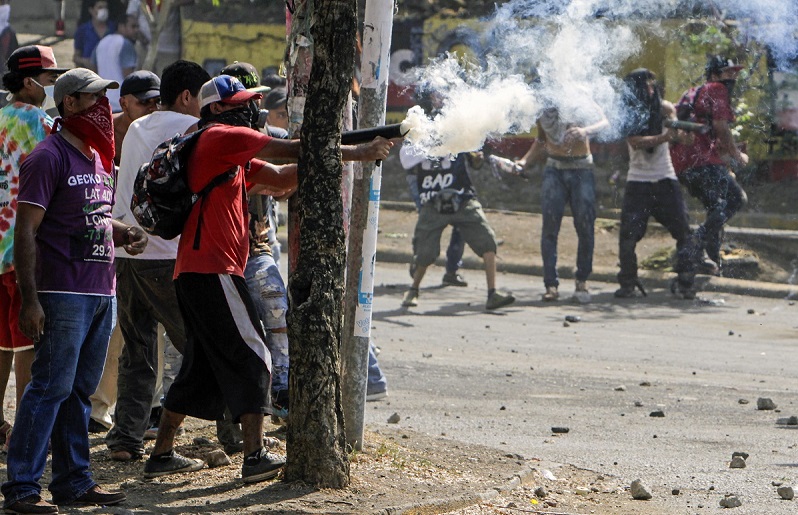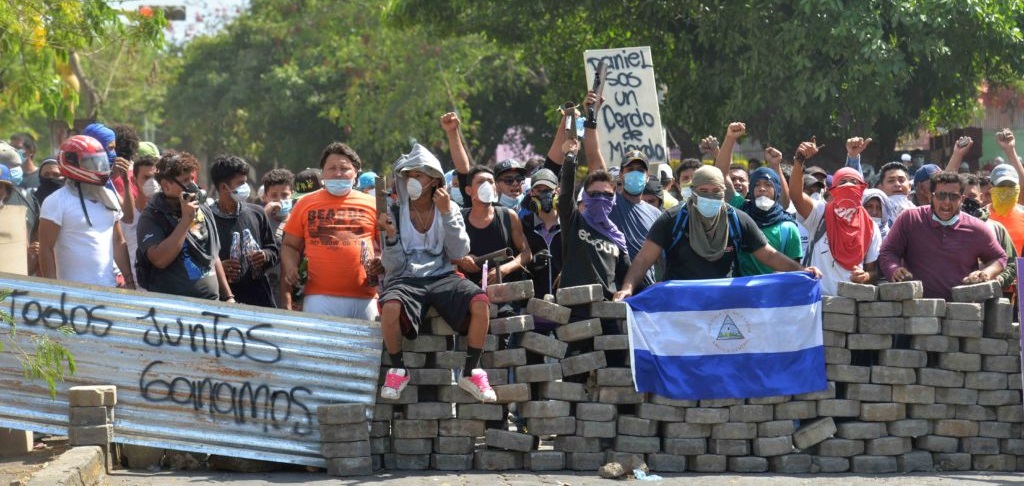Alwaght- While the global attention is focused on the West Asia developments, the United Nations Security Council held a meeting called for by the US to discuss the developments in Nicaragua.
The US envoy to the UN Nikki Haley said that the UNSC will address the situation in Nicaragua, adding that as the US takes the presidency of the UNSC it takes the global attention to the Central American country.
Why is Nicaragua in unrest?
The unrests started in April as people demonstrated against the government’s social security system reforms. The government withdrew the reforms after pressures, but the protests did not stop.
The incumbent government, led by President Daniel Ortega, is leftist and critical of the US policies in the region, and accuses Washington of supporting the opposition.
The White House imposed sanctions on the government and backed the opponents of President Ortega in a bid to overthrow him.

The country, unavoidably, is suffering from a troubled social security system. Since 2013, the system witnessed an increasing deficit. The government talked to the private sector, labor unions, and other institutions to address the challenge.
The International Monetary Fund, meanwhile, made recommendations to the government, including raising the retirement age from 60 to 65, privatizing the social security organization-run hospitals, and liberalizing the costs of medical services. The IMF prescription itself stood cause to some of the protests.
The US should pay “compensation”
During the UNSC meeting on Wednesday, the Nicaraguan Foreign Minister Denis Moncada responded to the American envoy's comments, criticizing the US for its past intervention in Nicaragua in the 1980s and urged it to pay compensation for its pro-terror actions in Nicaragua and "cease any type of aggression or intervention." The International Court of Justice ruled the US should pay compensation to the Nicaraguan government for damages from its intervention.
The FM further stressed that “in Nicaragua we love peace, we strengthen our security and we promote and defend human rights in a holistic way.”
Bolivian envoy attacks UNSC, Western double standards
On the other side, the Bolivian representative to the UN has reacted to the meeting call slamming it as a “ridiculous” meeting that intends to intervene in a country’s domestic affairs. He, furthermore, called for an end to the political and ideological abuse of the UNSC.
Sacha Liorenty told the representatives at the meeting that he was talking against the very holding of the session. He reminded the members of real duties of the UNSC which he said were the discussion of global peace and security, adding that Nicaragua home protests did not pose any threat to the international or regional peace.
Liorenty told the UNSC that his opposition to the meeting complied with the UN charter which very clearly bans intervention in the nations' home affairs. He continued that his country opposed manipulation and abuse of the UN Secretary-General's powers to exploit the deterrence diplomacy, which, according to him, will only worsen the situation instead of settling it. He said the UNSC could not recall the envoy of an independent state and interrogate him and accuses him. He added that such measures only undermine multilateralism and diplomacy and cut chances of dialogue.
The Bolivian representative further warned that such policy will develop double standards which on the one hand support democracy in one country and on the other hand fund coups and similar moves in another country.
He argued that the aim of the gathering was not to support human rights. “If it was, the pro-meeting sides signed the pro-rights international treaties, if it was, the US would not withdraw from the UN Human Rights Council, if it was, there was no support for the torturing of the refugees by separating the children from their parents.”
He called the attention to a US history of intervention, saying “we have a long history of intervention. Look at the Middle East. Only in the current century, these policies led to the gravest conditions in Libya, Syria, and Iraq.”
The Bolivian ambassador noted that the main goal of such meetings was to create an atmosphere of instability to use it to change governments and loot the nations’ natural and energy reserves. “In addition to democracy, justice, peace, and truth, the nations need an end to the foreign intervention.”
China and Russia oppose US, signaling competition in Central America.
But it was not only the Nicaraguan and Bolivian diplomats who came against the US-called meeting. China and Russia representatives also were opponents to the session.
The Chinese envoy said the Nicaraguan situation posed no risk to the international peace, recommending that the UNSC should not meddle in such cases. He added that his country had a history of respect for the countries' sovereignty, independence, unity, and territorial integrity. The envoy noted that China was committed to the principle of avoiding intervention in the countries’ domestic affairs.
The Russian envoy, too, was a vocal opponent of the meeting, arguing that the call for it was politically-motivated that could not yield positive outcomes.
Some even read the Russian and Chinese stance as falling under the traditional rivalry against the US, which is now intensified under President Donald Trump.
China rise as an economic power and the growing US concerns about losing its hegemony can be obviously seen in the two powers' competition in Central America. Over the past few years, Washington lost its place as the biggest trade partner to the regional countries. Now Beijing has this position. Over the past decade, the Chinese banks paid $140 billion in loans to Latin America. This huge investment grants China access to their markets and resources.
The former US Secretary of State Rex Tillerson earlier this year cautioned against Beijing footholds in Latin America, saying that China sought short-term commercial privileges in its journey for their long-term dependence on it.
Reacting to the Chinese presence in its backyard, Washington has embarked on a policy of destabilizing and meddling and subverting governments non-compliant to the White House policies.



























